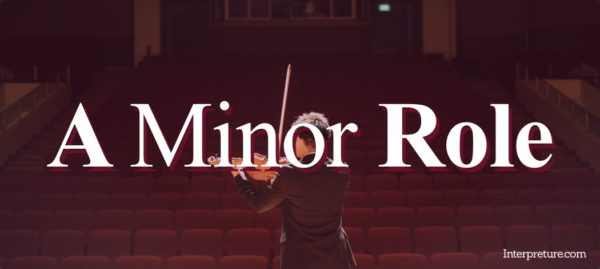‘A Minor Role’ by UA Fanthorpe explores the concept of an individual’s place in society, and the way that illness can impact it. Fanthorpe was born in London in 1929 and died in 2009, having become very well known for her work and her style of writing. This was despite only beginning to write and publish poetry part way through her life in the 1970s. During this time she was a receptionist at a hospital, with the varied surroundings providing much of her inspiration. She was also the first woman in 315 years to receive a nomination to be the Professor of Poetry at Oxford. Some may interpret ‘A Minor Role’ to be her own considerations of life as she grew older.
This poem is part of the set of prescribed poems that could be included in the Edexcel English Literature exam, meaning that it is important to study, understand and revise this poem. Click here to see all the prescribed poems from the ‘Poems of the Decade’ collection.

Interpreture gives ‘A Minor Role’ a difficulty rating of 4, meaning that it is deemed to be a relatively difficult poem. There are numerous challenging aspects to this poem, mainly the language due to the mix of devices and references to other works. The structure also contains challenging elements due to the lack of an overall pattern. The themes and meaning become clearer over the course of the poem, however it may still be difficult to find comparisons with unseen poems.
‘A Minor Role’
The title of the poem is one which encourages the reader to ask various questions and wonder about the situation. For example, what is the role? Why is it described as being ‘minor’? Is it relating to drama, or could it be another role? All of these questions and potential answers will help to create a variety of scenarios and ideas in a reader’s imagination, which would be very effective at encouraging a reader to potentially approach the poem with a more open mind as to what the subject matter may be. In addition, a reader could consider a more philosophical viewpoint to the idea of a ‘role’, which would particularly be the case if the title is being reflected on after a reader has completed reading the poem.

Poem Structure
One of the most apparent features of the structure in this poem is the irregular line length and stanza structure. In some ways the structure initially appears uniform, but strange and unique forms are made in the poem as it goes on. The reader may interpret this as showing the irregularity of life, and how parts of life can change quite suddenly and unexpectedly. The impact on the rhythm as a result of these structural changes is very noticeable, which further emphasises the idea of unexpected changes. Alternatively, the reader could consider the way in which the structure could link to that of a play or piece of drama which has different elements to a plot, and different paces of action.
There are also frequent caesura in the poem, particularly with semi colons in the second stanza. This links well with the irregular structure to show pauses and interruptions in life, perhaps indicating how people’s actions and thoughts may not be as ‘free’ as initially anticipated. There are also other breaks to the flow in the poem, such as the use of brackets to insert additional snippets of information, which highlights the complexity of life. Some readers may even find this variety of pace and structure somewhat overwhelming due to the constant changes. This would be a very effective outcome for the poem, as it would make ‘A Minor Role’ more memorable and encourage a reader to develop empathy for the narrator.
The single final line of the poem is very striking, due to the way it draws a readers attention when the poem is first viewed. The separation from the rest of the poem even draws a readers attention to it before they may even have started reading the rest of the poem, which if the case would be highly effective at making a reader consider the rest of the poem with a deeper meaning. Similarly, ending the poem on this line, rather than placing it at the beginning or the middle, would ensure that it remains one of the key thoughts for the reader.
Poetic Techniques
There are a range of examples of imperatives being used in ‘A Minor Role’ such as “admit it’s not” “make you believe” and “I’m best observed on stage”. This creates a sense of certainty and precision which is juxtaposed with the irregular and varied structure, with this sense of ‘conflict’ between language and structure encouraging a reader to consider the way in which the narrator is attempting to exert power and influence, while at the same time conforming to the irregular structure and unpredictability of the pace and rhythm.
In the second to last stanza, Fanthorpe takes the unusual step of adding an asterisk and then a reference to ‘Oedipus Rex’ which is a tragedy written by Sophocles, a playwright from Ancient Athens. The main character Oedipus begs for his death after learning that as a result of him being separated from his parents at birth, he had unknowingly killed his father and married his mother. While the exact story of the play is not seen as significant to the poem, the choice of this play is interesting because it can be seen as showing that even in the worst situations an individual should not wish for death or deem it better to die, with the following exclamation of “No it wouldn’t!” highlighting this opinion.
There is another form of contrast that is built up in the poem, but rather than being structural, it is instead different semantic fields. One of the key ones within the poem is that relating to medical themes, with words such as “formula” “consultant” “illness” and “dosages” which continue the idea that the narrator is suffering from a form of illness. At the same time there is the semantic field of the stage and drama, such as “roles” and “stage” which often are directly associated to the medical descriptions. This is one of the key ways in which the idea of the ‘minor role’ is brought to the poem.
Important Lines
“my heart’s in the unobtrusive”
The adjective “unobtrusive” is noticeable as a result of it being four syllables long, which may be interpreted as a link to the idea of a “heart” with the beat and rhythm of the word. Readers may interpret this line as considering the potential insignificance of life, but also the way in which health and emotion are directly linked.
“For well-meant intrusiveness”
The contrast between the positive connotations of “well-meant” and the negative connotations of “intrusiveness” makes this quite an interesting line for a reader to consider, and one that is likely to make them form their own opinion as to what degree they may find people enquiring about their health instructive. Some readers may also consider a potential disconnect between the narrator and society, with each wanting to do and experience different things.
“Saying Thank you // For anything to everyone”
The reader may find this line quite emotional due to the helpless and dependent feeling which is inferred, particularly with the word “anything” as it indicates an almost complete lack of control of the narrator’s personal situation. The use of italics helps to add further visual emphasis to the line, showing the way in which Fanthorpe sees it as important to the poem as a whole. Readers could also see a potential link to being on stage and completing a performance, once again linking to the idea that ‘the end’ is approaching.
‘A Minor Role’ Key Themes
- Identity: There are a range of hints and allusions to the loss of identity within ‘A Minor Role’, in particular the idea of saying thank you for “anything” and the way in which the medical semantic field consumes the poem. There is also the way in which the narrator sees themselves, and the contrast between an on stage and off stage identity, which much of the poem also rests upon.
- Power: In a similar way to the identity theme, power is also explored through the way in which it is lost and diminished as a result of illness. However, there can also be interpretations of gains in power and influence through medicine and the ‘power’ of the stage.
Quick Focus Questions
- Is the semantic field of drama and the stage effective for a typical reader? Could another link or idea be more effective for a reader?
- In what ways does the use of italicised text influence a reading of ‘A Minor Role’?
- Could a suggestion of conflict be found within the poem? Provide examples and explain how it would be influence a reader’s response.
‘A Minor Role’ is a poem which may have limited initial connections to other poems within the ‘Poems of the Decade’ anthology, however on greater consideration there are still a variety of links that can be made. One of the most important aspects of the poem to consider is the effect it has on a reader, particularly for the idea communicated in the final line of the poem and how the rest of the structure and language can be interpreted as leading to and supporting this statement, with other poems that have notable conclusions such as ‘The Lammas Hireling’, ‘The Gun’ or ‘On Her Blindness’. Alternatively, comparisons with the theme of identity could be made with ‘Material’ or the theme of power in ‘Chainsaw Versus the Pampas Grass’.







3 Comments
So helpful
would be so lost without all these incredibly helpful resources :)
Need to look at the effect of the words, rather than just what they mean. Hard to write an essay as is very vague on the effect.